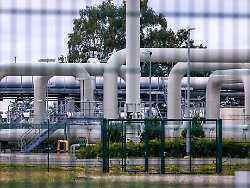Maintenance work and delivery stop
No gas from the Baltic Sea pipeline – all routine?
7/11/2022 4:46 am
Germany looks spellbound in the direction of Lubmin on the West Pomeranian Baltic Sea coast. It has been clear for a long time: From this Monday morning, due to routine maintenance work, no more natural gas will flow through the Nord Stream 1 pipeline to Germany. The real question is: for how long?
Why is the gas supply interrupted?
According to the operator Nord Stream AG, the reason is annual maintenance work on the pipeline. We are talking about checking and, if necessary, repairing or calibrating the power supply, fire and gas protection and certain valves. Software updates would also be made. The offshore pipelines remained under pressure. According to the Federal Network Agency, the work is not taking place on the actual line, but on the compressor stations, for example in Lubmin.
How long will no gas flow?
From today, Monday morning, 6:00 a.m. until July 21, 6:00 a.m. – i.e. for ten days – no more gas should flow. According to the operator, the corresponding work lasted between 10 and 14 days in the past few years. However, they also partially deviated from the set deadline. In model calculations, the Federal Network Agency assumes up to 14 days, but has already included a time buffer. Under normal circumstances, the work should be completed within the planned period, the authority said. Therefore, one looks more at how things will continue on July 21st or 22nd.
How much gas flowed through the pipeline last?
The Russian state-owned company Gazprom had already reduced the delivery volume through the more than 1,200-kilometer pipeline in June and referred to delays in repair work. Most recently, according to the Federal Network Agency, the line was only about 40 percent utilized. According to Russia, these delays were related to sanctions imposed on Russia by the West for attacking Ukraine. Chancellor Olaf Scholz had criticized the reasoning as advanced. Among other things, it was about a pump that could not be delivered back to Russia after maintenance in Canada. However, Canada has now announced that it will allow the serviced turbine to be delivered from Montréal despite the sanctions against Russia.
Why shouldn’t the gas flow any longer this time?
In mid-June, Russia’s ambassador to the EU said that a complete shutdown was also possible because of the problems with the repair work. Federal Economics Minister Robert Habeck (Greens), among others, fears such a thing. He recently said he sees a pattern that could lead to this scenario. Habeck also spoke of an “economic warlike conflict” with Russia. Russian gas deliveries via other lines to Germany had also recently fallen significantly. At the same time, several European states that support the government in Kyiv are already stopping receiving gas from Russia.
How important is the pipeline for gas supply?
The pipeline, commissioned in 2011, has been the conduit through which a significant majority of Russian gas has been delivered to Germany for at least the past few months. Other pipelines for Russian natural gas are the Yamal pipeline, which arrives in Mallnow, Brandenburg, and a pipeline system running through Ukraine with a connection point in Waidhaus, Bavaria. According to the Federal Network Agency, no gas has been arriving in Mallnow for some time, in Waidhaus the amount has recently also fallen significantly and was only a fraction of the amount arriving in Lubmin before that. According to the Economics Ministry, the share of Russian gas deliveries in Germany was 55 percent last year, but had fallen to 35 percent by the end of April this year.
What happens if Nord Stream 1 remains permanently closed?
There would probably not be a gas shortage in Germany immediately. This is the result of model calculations by the Federal Network Agency. But: Germany could not fill up its gas storage tanks as much as intended before the heating season. In addition, according to the calculations, without gas from Lubmin, there could possibly be a shortage in winter. A more recent diagnosis by several German economic research institutes, on the other hand, comes to the conclusion that even in the worst case scenario, there is no longer any risk of gas bottlenecks this year and in the coming year only in rather unfavorable scenarios. Irrespective of this, a sustained delivery stop would probably cause prices to continue to rise. The companies affected by the restricted deliveries already have to procure them elsewhere on the market at significantly higher prices. According to the Federal Network Agency, private consumers must also be prepared for significantly increasing gas prices. They expressly support the request to save as much gas as possible.
